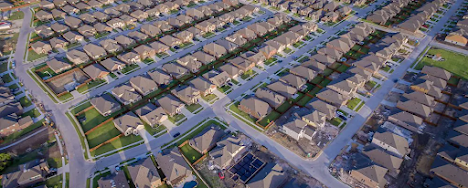Sub-Urban community
Urban sprawl in America, magnified by the GI bill, has created neighborhoods across the country that are very identical to each other. I've traveled to very few states and have seen suburbs across those states. They all have a highway that connects the development to the city center. A two-lane street takes you through the neighborhoods, and a four-lane road takes you through the commercial strip of the suburban development. I've always asked this question myself - What's the reason behind the development of these communities? What is the necessity of creating 12 dozen houses with a supermarket? These houses became more of a place to rest than to produce. Residents of these suburbs still travel miles to work as their jobs are in the city centers. These suburbs are born due to people's desire for more space and privacy.
I've always argued that suburban life doesn't have communal living like cities. But listening to my classmates' stories and arguments made me realize that these suburbs bear more close-knit societies than I thought. You know your neighbor and almost everyone who lives across the street. In a city, you share the same stairs as your neighbor, but you hardly know them by name. Social interactions happen more often in cities than in the suburbs but at a different level of intimacy. I think about how a community is defined and perceived in other contexts. It has different meanings in a city from suburban life.





It's interesting to see the types of interactions in different spatial conditions. Reflecting on my own experiences, I've lived in 3 types of spaces, rural, urban, and now suburban. I grew up in a rural area where everyone knows everyone and conversations would be much more specific. Spending time in an urban setting, there was a sense of being immersed in a constant public realm, but perhaps because I was just a visitor I didn't have the communal feel I had in rural America. Now living in a suburban area, I find myself making more small talk with neighbors, but I couldn't tell you much about them. I think a sense of community really depends on the people more than anything, and the effort to make yourself part of that community.
ReplyDeleteHey Jerome! Your take on urban sprawl is interesting, especially considering that you don't share the same experiences as the remainder of us because of your different background. However, I didn't totally agree with some of the arguments made in the class. I've lived my entire life in a suburban neighborhood, and I didn't know many people who lived on my street. This was primarily due to the lack of other kids my age within my area, so it was very isolating. Therefore, I'm biased to argue the counter; That living in an urban space would be more beneficial in terms of social interaction because of the diversity in people and close proximity.
ReplyDeleteResponding to this conversation, I think the idea of close-knit communities in suburbia can sometimes depend on the people that live there and their willingness to be social with their neighbors. As a kid, I would play outside with kids in my neighborhood but saw a difference in my younger brother's childhood due to the increase access to technology and screens to kids. This is a generational thing more than where we lived and who lived nearby.
ReplyDeleteAlso joining in on this conversation, I completely agree with what Erin is saying, these close-knit communities depend on the people. Its almost a generational thing, these close-knit communities kind of have a time limit. When I was younger, I always played outside with my neighbors because they were all around my age, my neighborhood would also have block parties and "deck crawls". Now as I am older, a lot of those families that I was close to have moved out, and a new generation of younger families have filled those homes but the neighborhood is not as lively anymore. This leads to my question of how can we design to keep that communal aspect of suburbia to last beyond generations?
ReplyDelete